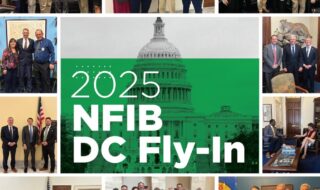February 24, 2025
Small business in the Thick of 10 Bills Dealing with Workers’ Compensation
State Director Ronda Wiggers reports from Helena on the legislative and political weeks ending February 14, February 22
Big Deadline Ahead
February 26 will be the last day to introduce a general bill for this legislative session. Bills that raise revenue or appropriate money can still be introduced for a few more weeks. However, this first deadline will substantially reduce the number of new bills we see each week.
The transmittal deadline is March 5. This is the date that all general bills must have passed out of their originating chamber (either the House or the Senate) or they are dead in the process. This also reduces the number of bills we will need to keep tracking.
Now the bad news: it was announced on the House floor on Saturday (February 22) that there are currently more than 300 bills in editing. They will all be guaranteed a hearing prior to transmittal deadline!
In order to see where we have been and keep track of what needs to be moving thru the process prior to the transmittal deadline that is fast approaching, I am changing the weekly report a bit.
Below you will find a list of all the bills we are tracking by category and numerical order. I have also included those that have been Tabled, as they can be brought back up for reconsideration until the transmittal deadline passes. This is most likely to occur just two days before the deadline when everyone is busy and not watching. The most current action on each bill is underlined.
Unemployment Insurance
— HB 131 Revise duration of Unemployment Insurance Benefits
Sponsored by Rep. Kerri Seekins-Crowe, HB 131 lowers the number of weeks that a person can collect unemployment from 24 weeks to 20 weeks. The committee amended the bill to allow for 24 weeks of UI for those that are ‘job attached’ or ‘union attached.’ This addresses the concerns of the road construction contractors that felt they may lose employees if the UI did not cover their down time, which is dictated by the state transportation department. The bill passed the full House floor debate (second reading) on a vote of 56-44. Two Republicans, Valerie Moore and Gary Parry, joined the Democrats in opposing HB 131. The bill was then heard in Appropriations committee, as it reduces state expenditures by over $5 million per year and needs to be included in the budget. Appropriations TABLED the bill on an 18-to-5 vote. NFIB supports this bill
— HB 210 Revise laws relating to Unemployment Insurance Program Collection Rates
Sponsored by Rep. Steve Fitzpatrick, HB 210 passed the House floor unanimously. It has been transmitted over to the Senate where it has been referred to the Business & Labor Committee. This bill will create a lower tier of UI premiums. Currently, Montana is in the lowest schedule allowed by law and the fund is actuarily sound. Just reducing what is paid out does not reduce premiums. This bill is projected to reduce premiums by $38 million over the biennium. NFIB supports this bill.
Workers’ Compensation
— HB 367 Revise workers compensation laws relating to travel and reimbursement
Sponsored by Rep. Ed Buttrey, HB 367 would add to workers’ compensation law that an employee is not automatically covered by work comp just because they are in a vehicle that is supplied by the employer or is being reimbursed for travel costs. This would further remove personal use from coverage. SB 367 passed the House unanimously and has been transmitted to the Senate. NFIB supports the measure.
— HB 143 Revise definition of treating physician to include PA without regard to proximity of other providers
Sponsored by Rep. Jodee Etchart, under current law, a physician assistant (PA) can only be used as a treating physician if there are no doctors in the area. As PAs are often easier to schedule with and less expensive, this is a cost-saving change for workers’ comp. It has passed the House and been referred to Senate Public Health committee. NFIB supports HB 143.
— HB 197 Revise Worker’s Compensation relating to when the employee is released to work
Sponsored by Rep. Anthony Nicastro, this bill is intended to speed up the time between when an injured worker is released to go back to work and when they can actually go back to work. Prior to an adverse court ruling, when an employee was released for full duty, with no restrictions, they could simply go back to work. A court ruling created a loophole where the employee needs to go through a check-in type process that can take a month or longer. This bill corrects that ruling. NFIB supported the bill, and it passed the House and was heard in the Senate Business & Labor Committee. The committee has not yet voted on the bill, which NFIB supports.
— HB 428 Revising provisions related to workers compensation
Sponsored by Rep. Morgan Thiel, HB 428 has passed the House Business & Labor Committee on a 20-0 vote and will be debated on the House floor. This bill slightly changes the definition of an employer. Currently, under Montana law, if a business retains a sub-contractor, it is presumed liable for the worker’s compensation UNLESS the subcontractor has full control over all aspects of the worker AND they carry a work comp policy on the worker. This would eliminate the need to prove that the subcontractor carried a work comp policy in order to prove that the general contractor is not liable. It also makes some changes in the reports that the insurer and the medical provider need to supply.
— SB 109 Revise workers’ compensation definition of treating physician to include Physical Therapists
Sponsored by Sen. Greg Hertz, SB 109 passed out of Senate 50–0 and has been referred to the House Business & Labor Committee. This centered more on the scope of practice for PT than on whether it would save any money. NFIB only monitored this bill.
— SB 291Revise laws related to workers’ compensation definition of wages
Sponsored by Sen. Andrea Olsen, this bill simply requires the insurance agency to update the value of employer-supplied housing each year. The bill was heard in the Senate Business & Labor Committee but no vote was taken. Monitor only
— SB 295 Restoring the right for injured worker to choose their own doctor, sponsored by Also by Senator Olsen, this is a doctor-shopping bill. Restricting this has saved workers’ compensation money, thus reduced premiums. Removing the restriction would likely result in higher premiums. The bill was heard in Senate Business & Labor Committee but no vote was taken. NFIB opposes.
— SB 308 Revising workers’ compensation insurance laws to remove the limitation on benefits to the state’s weekly average wage
Sponsored by Sen. Derek Harvey, SB 308 was heard in the Senate Business & Labor Committee. The current benefit is two-thirds of the employees’ wages, no less than $900 per week and no more than one-half of the states average weekly wage. NFIB will join other industry groups and the State Fund in opposing this expensive legislation. The committee has not yet voted.
— HB 516 Move workers compensation court to judicial branch
Sponsored by Rep. Kenneth Walsh, this measure would move the court from the Department of Labor to the Department of Justice. It will be heard in House Business & Labor Committee. NFIB is monitoring the bill.
— SB 346 Revise workers compensation laws
Sponsored by Sen. Greg Hertz, this bill provides that payment of benefits is not required when there has not been an acceptance of liability and changes the law relating to compliance with medical treatment. It is scheduled for hearing in the Senate Business & Labor Committee on February 28. NFIB will monitor.
Wage & Hourly/ Human Resources Issues
— HB 226 Provide for legal employment and Government Accountability
Sponsored by Rep. Courtnay Sprunger, this bill allows for the Montana Department of Labor to check I-9 forms when checking employment records for compliance. While it appears to be requiring E-Verify, it is allowing it OR the use of an I-9. By adding the requirement to Montana law, the DOL can check for compliance. It has passed the House and been transmitted to the Senate. NFIB is monitoring the bill.
— HB 275 Provide for a driving privilege card
Sponsored by Rep. Ed Stafman, this copies Idaho law that allows an immigrant who is in the state legally and legally employed to obtain a limited driving license so that they can drive for work. This bill has passed House Transportation committee and will likely be debated on the floor next. Monitor
— HB 297 Establish requirement for paid sick days
Sponsored by Rep. SJ Howell, HB 297 was TABLED in the House Business & Labor Committee. It would have required all businesses with more than 10 employees to offer paid sick leave. NFIB has opposed this proposal as unnecessary government regulation of small business.
— HB 319 Prohibiting employer requirements for employees to attend controversial social vision training
Sponsored by Rep. Steven Kelly, HB 319 the House Judiciary Committee TABLED the bill. This bill measure would have made it illegal to terminate an employee who refuses to attend any training that is outside the scope of employment, if that training promotes a controversial social vision.
— HB 484 Providing for an increase in the minimum wage
Sponsored by Rep. Kelly Kortum, HB 484 would increase the state minimum wage to $12.06 an hour and continue the COLA going forward. Montana’s minimum wage was $10.30 in 2024 and increased to $10.55 January 1, 2025. This will be heard in House Business & Labor Committee. NFIB will continue to oppose this.
— SB 313 Revise laws relating to wage transparency
Sponsored by Sen. Jacinda Morigeau, this proposal is a bit vague in what it requires of an employer other than advertising wages. It is scheduled for hearing in the Senate Judiciary Committee. NFIB is opposed.
— SB 325 Creating family and medical leave act
Sponsored by Sen. Derek Harvey, SB 325 was heard in the Senate Business & Labor Committee, which has not yet voted on it. It would require a 1% payroll tax to fund the paid medical leave through a new state program. NFIB opposes SB 325.
— SB 329 Require employers to use e-verify for employment eligibility
Sponsored by Sen. Forrest Mandeville. this bill would not only require all employers to use E-Verify but also moves the enforcement to the attorney general’s office. It is scheduled for hearing in the Senate Judiciary Committee February 28. The sponsor has indicted that he is willing to move the threshold for compliance to businesses with greater than 50 employees.
— LC 1967 Prohibiting employers from offering incentives to employees to register to vote.
LC 1967 would fine employers $1000 if they financially incentivize their employees to register to vote.
LC 1421 Revise labor law relating to computation of meal allowances
No language available at this time.
Taxes
— HB 231 – Revise Property Tax Rates for Certain Property
Sponsored by Rep. Llew Jones, HB 231 is Gov. Greg Gianforte’s property tax proposal. It would lower the taxable rate on owner-occupied homes and monthly rental property that are less than four times the median residential value from 1.35% to 1.1% (non-owner occupied homes, short-term rentals and vacant property would increase from 1.35% to 1.9%); commercial property would have their tax rate on the value that is less than 6 times the average commercial value from 1.89% to 1.5%. The value in excess would see their tax rate increase from 1.89% to 2.1%. According to the fiscal note, the “break even” point for commercial property would be about $6 million. Everyone valued less than that amount would see a decrease in tax and everyone with a value higher would see an increase in their taxes.
— HB 337 Revise income tax laws to lower income taxes
Sponsored by Speaker Brandon Ler, HB 337 was heard in House Tax Committee. This is an alternative to the governor’s income tax reduction proposal. Currently, on a joint return, Montana income is taxed at 4.7% up to $41,000 and then 5.9% on everything in excess. This bill proposes to apply the 4.7% rate on all income up to $140,000 and then assess 5.65% on income in excess. It makes the corresponding changes to individual, head of household rates and changes net, long-term capital gains rates as well. NFIB monitored this bill, which had no proponents or opponents. The committee will likely hold this bill until all of the different proposals have been heard.
— HB 489 Revise sales tax laws to provide for local option tax
Sponsored by Rep. Greg Oblander, HB 489 was heard in the House Local Government Committee, which took no action on it. NFIB members have voted to oppose all local option sales taxes.
— SB 322 Increase business equipment tax exemption
Sponsored by Sen. Josh Kassmier, SB 322 would increase the current exemption from $1 million to $3 million for taxable equipment. This is part of the governor’s budget proposal. It has not yet been scheduled for hearing. NFIB supports it.
Tort Reform
— HB 302 Revising punitive damages laws and procedures
Sponsored by Rep. Anthony Nicastro, HB 302 would require more evidence in order to award punitive damages. It has passed the House 52–47 and has been referred to Senate Judiciary but no hearing has been set.
— HB 303 Revise and clarify the law regarding apportionment of fault
Another measure sponsored by Nicastro, HB 303 makes it clear that a party that has previously settled can still be determined to be at fault passed the House 53–46 and has been referred to Senate Judiciary, but no hearing date has been set.
— SB 143 Generally revise civil liability laws relating to statutes of limitations for certain actions
Sponsored by Sen. Greg Hertz, SB 143 passed the Senate 47–2 and has been referred to the House Judiciary Committee. This bill is a tort reform proposal to reduce the statute of limitations for work done on improvements to real property from eight and 10 years to six years. NFIB supported the bill.
Miscellaneous
— HB 160 Repeal uniform auxiliary container regulation laws
Sponsored by Rep. Ed Stafman, HB 160 was TABLED in the House Local Government Committee. This bill would have repealed Montana’s law that does not allow local governments to regulate containers. NFIB testified against the repeal. Statewide conformity is best and small business does not need regulation on what type of containers they are allowed to use.
— HB 290 Regulate sales of certain products containing PFAS
Another measure sponsored by Stafman, the bill would require that all juvenile products, cosmetics, menstrual products and firefighting foam and turnout gear either have no PFAS or, in the case of the fire materials, report the PFAS. It also requires that manufacturers supply a “certificate of compliance” for each product to each retailer. NFIB opposed this added burden on small business, and the committee has TABLED the bill.
— HB 463 Revise business laws relating to conversion of certain business entities
Sponsored by Rep. Steve Fitzpatrick, this bill makes it easier for an LLC to convert to a Corporation or LLP. It was heard in House Business & Labor Committee, which has not yet voted on it yet.
— HB 477 to phase out polystyrene single use food containers
Scheduled to be heard in House Natural Resources. NFIB will oppose at the request of our restaurant and grocery owner members.
— HB 530 Generally revise business laws
Sponsored by Sen. Steve Fitzpatrick, this bill is making business changes and filings with the Secretary of State easier. It will be heard in House Business & Labor Committee.
SB 19 Revise sentencing laws related to theft
Sponsored by Sen. Barry Usher, this bill will increase the penalties for theft and bad checks in an attempt to cut down on the amount of retail theft many are experiencing. NFIB joined a number of retail associations in supporting this effort. The bill passed the Senate, after floor debate, on a vote of 32 to 16. It is now in the hands of the House Finance & Claims Committee, because it has a cost of nearly $2 million over the biennium.
SB 418 Generally revise laws relating to home based businesses
Sponsored by Sen. Ellie Boldman, SB 418 would prohibit local governments from prohibiting home-based businesses. It has been introduced but not yet scheduled for hearing in the Senate.
LC 3023 Revising laws related to credit card transaction fees
Sponsored by Rep. Steve Fitzpatrick proposes to make credit card transaction fees legal but require them to be capped at 3% or as otherwise provided in your contract and that the fee is clearly disclosed to customers prior to the transaction. NFIB will monitor.
Prior Weekly Reports
— February 7—NFIB Tracking Nearly 30 Measures Important to Small Business for Support, Opposition, or Tracking
— February 2—NFIB-Supported Unemployment Insurance, Workers’ Comp Bills Advance
— January 26—Legislature Simmers Down, Settles into Normal Pace
— January 20—Governor’s Property Tax Proposal Starts Legislative Run
— January 12—Chaotic Start to the 2025 Legislative Session
— January 6—Montana Legislature Starts its 2025 Session
NFIB is a member-driven organization advocating on behalf of small and independent businesses nationwide.
Related Articles













